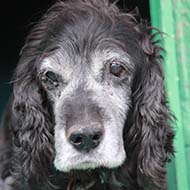Animalcare releases resources on senior pet care

"We hope to help practices put the health and wellbeing of senior pets back on the agenda" - James Beaumont.
Animalcare has released a set of resources on senior pet care, entitled 'Making Senior Easier', in order to help veterinary professionals educate owners to ensure the wellbeing and health of senior pets.
The resources include health check materials, including a 'senior triage' form to be completed by owners, and a 'senior pet assessment form' which can be used as a checklist for practice staff, condition handouts for owners detailing common age-related issues, and generic short articles on age-related issues for use in newsletters and on websites.
These resources have been created in response to a survey of RVNs, which highlighted the need for opportunities for greater focus on caring for senior pets in practice.
The survey found then fewer than three in 10 practices currently run senior pet clinics, alongside a clear view among all respondents that additional educational resources would be useful in supporting their efforts to engage with owners of senior pets.
Key obstacles identified in running senior vet clinics were staffing issues and a lack of time, while seven in 10 survey respondents felt that clients did not understand the benefits of regular clinic attendance.
Marketing manager at Animalcare, James Beaumont, commented on the new resources: “We hope to help practices to put the health and wellbeing of senior pets back on the agenda.
“To support them, we have created a suite of ‘Making Senior Easier’ resources to help them educate owners to ensure that their pets live longer and healthier lives.
“We hope that practices will find them useful and that they will help them, not only to provide a higher standard of care to pets as they get older, but also enable them to build stronger client relationships by offering a proactive approach to the care of senior pets.”
The resources are available to download at animalcare.co.uk/seniorpet, and any practices wishing for further information can contact Animalcare's head office on 01904 487687.



 The Veterinary Medicines Directorate (VMD) is inviting applications from veterinary students to attend a one-week extramural studies (EMS) placement in July 2026.
The Veterinary Medicines Directorate (VMD) is inviting applications from veterinary students to attend a one-week extramural studies (EMS) placement in July 2026.